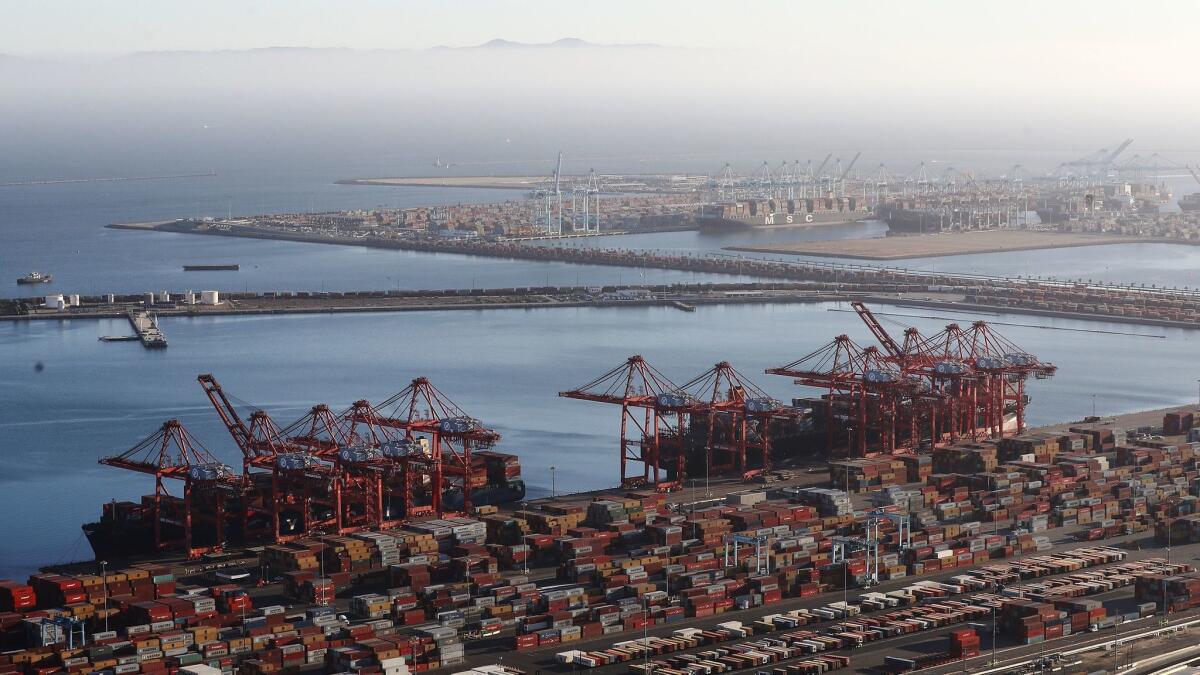‘Fugitive emissions’ from oil tanker identified as a source of foul mystery odors in local cities

- Share via
Inspectors say they have identified “fugitive emissions” from a 2-million-barrel crude oil tanker as a culprit in periodic pungent odors that have offended coastal residents and whose source has eluded detection for years.
The South Coast Air Quality Management District issued a violation notice last week in Long Beach to Nave Photon, a tanker that sails under the Hong Kong flag and transports crude oil to the United States from the Middle East.
The agency started tracking the ship Oct. 26 after receiving complaints of petroleum-like odors in Long Beach downwind from where Nave Photon was docked.
The AQMD has received more than 2,000 complaints since the beginning of 2016 from residents of Long Beach, Huntington Beach, Newport Beach, Seal Beach and Costa Mesa about odors similar to chemicals, gas or rotten eggs.
Gas images showed vapor leaks coming from the vessel, prompting an onboard inspection by the AQMD on Nov. 3 at a terminal where the ship was berthed at the Port of Long Beach, the agency said.
The AQMD said inspectors using hydrocarbon detection devices and gas-imaging cameras found that seven of 10 inspected pressure release devices on Nave Photon were leaking hydrocarbon vapors “well in excess” of the agency’s limits.
On Nov. 6, the AQMD issued a violation notice to GAC North America, the Long Beach-based shipping agent for the tanker.
Peter Moerman, GAC’s vessel manager for Nave Photon, was not immediately available for comment Monday.
Huntington Beach City Councilman Patrick Brenden said Monday that he was “excited” that the AQMD went public in pinpointing a source of the odor problem. The smell has generated speculation and reports that the cause could be anything from gas leaks to oil rigs to natural occurrences offshore.
Brenden, who is part of the city’s Coastal Area Odors Committee, said he visited Washington, D.C., earlier this year to collaborate with the Environmental Protection Agency and the Coast Guard to investigate the issue.
Brenden said he hopes the AQMD will continue investigating and issuing citations to encourage shipping companies to monitor their pressure release valves.
“For the past two years we have devoted extensive resources to finding the sources of periodic foul odors in Long Beach, Seal Beach and Huntington Beach,” said Wayne Nastri, AQMD executive officer.
The agency partnered with the fire departments in those cities to train their personnel to collect air samples when residents report odors.
Analysis of those samples showed higher levels of chemical compounds indicative of an odor from crude oil or unprocessed natural gas, the agency said. The compounds included several hydrocarbons and hydrogen sulfide, the agency said.
Crude oil contains dissolved hydrocarbon and sulfur gases that can be released to the atmosphere if not properly contained.
Hydrocarbon levels in the majority of the air samples were not expected to cause serious health problems, the AQMD said. However, the agency acknowledged the odors can have temporary health effects such as headaches and dizziness, which some residents have reported.
Huntington Beach officials have maintained that the foul smell is an irritant but not an immediate threat to health.
All the latest on Orange County from Orange County.
Get our free TimesOC newsletter.
You may occasionally receive promotional content from the Daily Pilot.




